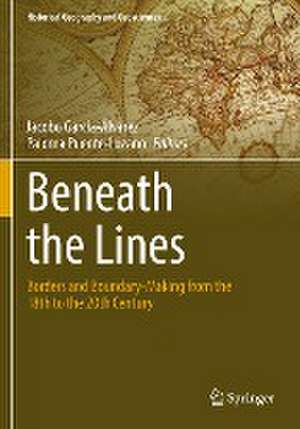Beneath the Lines: Borders and Boundary-Making from the 18th to the 20th Century: Historical Geography and Geosciences
Editat de Jacobo García-Álvarez, Paloma Puente-Lozanoen Limba Engleză Paperback – 5 mai 2023
| Toate formatele și edițiile | Preț | Express |
|---|---|---|
| Paperback (1) | 728.07 lei 39-44 zile | |
| Springer International Publishing – 5 mai 2023 | 728.07 lei 39-44 zile | |
| Hardback (1) | 896.84 lei 3-5 săpt. | |
| Springer International Publishing – 4 mai 2022 | 896.84 lei 3-5 săpt. |
Preț: 728.07 lei
Preț vechi: 957.99 lei
-24% Nou
Puncte Express: 1092
Preț estimativ în valută:
139.31€ • 146.23$ • 115.63£
139.31€ • 146.23$ • 115.63£
Carte tipărită la comandă
Livrare economică 07-12 aprilie
Preluare comenzi: 021 569.72.76
Specificații
ISBN-13: 9783030969066
ISBN-10: 3030969061
Pagini: 172
Ilustrații: XII, 172 p. 35 illus., 27 illus. in color.
Dimensiuni: 178 x 254 mm
Ediția:1st ed. 2022
Editura: Springer International Publishing
Colecția Springer
Seria Historical Geography and Geosciences
Locul publicării:Cham, Switzerland
ISBN-10: 3030969061
Pagini: 172
Ilustrații: XII, 172 p. 35 illus., 27 illus. in color.
Dimensiuni: 178 x 254 mm
Ediția:1st ed. 2022
Editura: Springer International Publishing
Colecția Springer
Seria Historical Geography and Geosciences
Locul publicării:Cham, Switzerland
Cuprins
Chapter 1 Drawing the lines, knowing the borders. An overview of recent scholarship on boundary-making and modern regimes of territorialization.- Part I. Boundary Treaties and Joint Commissions: Theoretical Foundations and Praxis on the Ground.- 2. Modern State Sovereignty as Geometric Purification of Territory. Delimitation Theories and Practices in the 1864 Spanish-Portuguese Boundary Treaty.- 3. Delimitation of the Spanish-Portuguese Border and the Controversy over La Contienda.- 4.From a Line on a Map to Realities on the Ground. The French-German Joint Boundary Commission at Work (1871-1877).- 5. Mexican Geographer Engineers and the Demarcation of Mexico's Borders.- Part II. Contesting the Naturalness of Borders. Cartographic Practices, Geographical Knowledge and Territorial Issues.- 6. Borders on Paper, Borders on the Ground. Boundary Commissions Under the Treaty of Madrid and Their Role in the Reinvention of the Rio de la Plata Frontier (1752-1759).- 7. Rights of Use vs. Natural Boundary: Demarcation of the Iraty Forest Massif (Western Pyrenees, 17th-19th Centuries) 8. A Water Borderline Adrift Between France and Spain. The Bidasoa and the Bay of Higuer at the End of the 19th Century.- 9. Demarcation of the Border of the Spanish Protectorate in Morocco (1913–1931): Chronicle of Failure.- Part III. Concluding Essay.- 10. Borders at the Global Turn.
Textul de pe ultima copertă
This book brings together ten empirically rich and theoretically informed contributions that aim to clarify both geo-historical specificities and common transnational and global features of the cultures and practices of boundary making that shaped modern statehood. Written by scholars from Spain, France, Italy, Argentina, Brazil and Mexico, the essays included in this volume provide a comparative international perspective on the processes of border formation, as well as an integrative approach that seeks to strengthen the links between renewed geo-historical studies and more contemporary-oriented border studies. The book is addressed to a wide range of researchers, including geographers, historians, political scientists and specialists in geopolitics and the history of international relations.
Caracteristici
Provides a comparative international perspective on the processes of modern border formation Adopts an integrative approach seeking to bridge geo-historical studies and more contemporary oriented border studies Allows to question, qualify, or correct certain dominant interpretations on modern boundary-making processes













